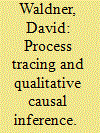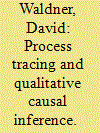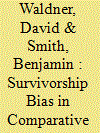|
|
|
Sort Order |
|
|
|
Items / Page
|
|
|
|
|
|
|
| Srl | Item |
| 1 |
ID:
140399


|
|
|
|
|
| Summary/Abstract |
This essay critically reviews this symposium's essays on process tracing and security studies by James Mahoney, Andrew Bennett, and Nina Tannenwald. It covers three major issues that have not been adequately addressed by previous writings on process tracing: the relationship of single case studies to more general causal claims, the conceptualization of causation, and the criteria of valid causal inference. It introduces the “completeness standard,” which combines causal graphs, event history maps, and invariant causal mechanisms. The completeness standard, it argues, bridges unit-level causal inferences and average treatment effects, invokes an epistemologically warranted conceptualization of causation, and better satisfies existing standards of causal inference by making unit homogeneity assumptions more credible.
|
|
|
|
|
|
|
|
|
|
|
|
|
|
|
|
| 2 |
ID:
140400


|
|
|
|
|
| Summary/Abstract |
This essay critically reviews this symposium's essays on process tracing and security studies by James Mahoney, Andrew Bennett, and Nina Tannenwald. It covers three major issues that have not been adequately addressed by previous writings on process tracing: the relationship of single case studies to more general causal claims, the conceptualization of causation, and the criteria of valid causal inference. It introduces the “completeness standard,” which combines causal graphs, event history maps, and invariant causal mechanisms. The completeness standard, it argues, bridges unit-level causal inferences and average treatment effects, invokes an epistemologically warranted conceptualization of causation, and better satisfies existing standards of causal inference by making unit homogeneity assumptions more credible.
|
|
|
|
|
|
|
|
|
|
|
|
|
|
|
|
| 3 |
ID:
181548


|
|
|
|
|
| Summary/Abstract |
Cross-national statistical research based on “all country” data sets involves no deliberate selection and hence ignores the potential for endogenous selection bias. We show that these designs are prone to selection bias if existing units are subject to differential survival rates induced, in part, by treatment. Using rudimentary graph theory, we present survivorship bias as a form of collider bias, which is related to but distinct from selection on the dependent variable. Because collider bias is always relative to a specific causal model, we present a causal model of post-colonial sovereignty on the Arabian Peninsula, show that it implies survivorship bias in the form of false positives with respect to the political resource curse, and provide historical evidence confirming that the model correctly depicts the creation of sovereign countries on the Arabian Peninsula but not elsewhere. When we correct for endogenous selection bias, the effect of oil on autocratic survival is shown to be negligible. The study motivates the need to think more broadly about the nature of the data-generating process when making causal inferences with observational data and to construct statistical models that are sensitive to treatment heterogeneity and rooted in context-specific knowledge and qualitative inferences.
|
|
|
|
|
|
|
|
|
|
|
|
|
|
|
|
|
|
|
|
|